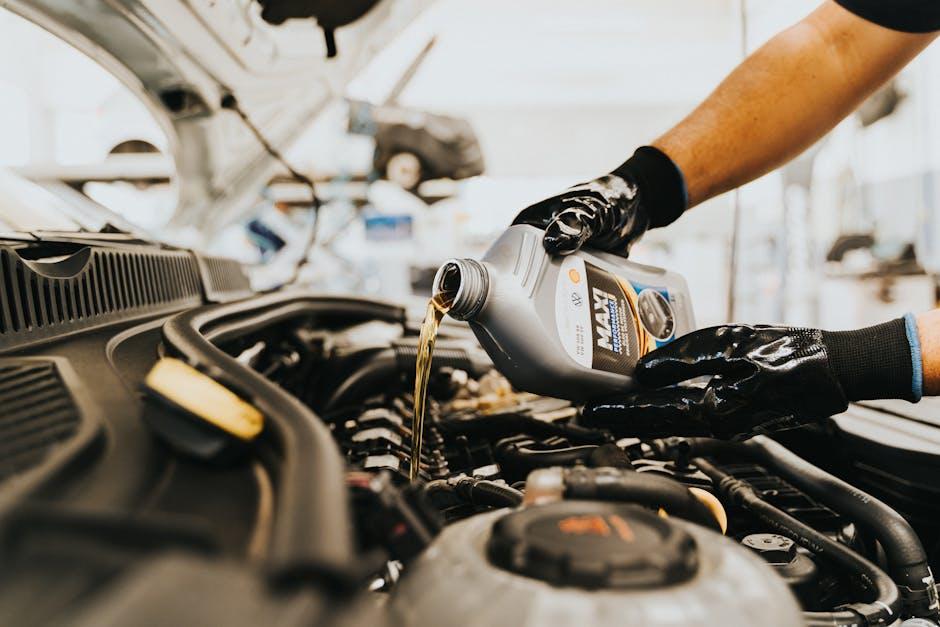Engines—those intricate hearts of our machines—have long been surrounded by tales spun in garages, highways, and coffee shops alike. Some of these stories spark curiosity, others breed confusion, and a few persist stubbornly as “truths” despite all evidence to the contrary. In this article, we dive beneath the hood to separate fact from fiction, debunking common engine myths that have revved their way into popular belief. Whether you’re a seasoned gearhead or a casual driver, it’s time to tune in and get the real story on what keeps your engine running smoothly.
Table of Contents
- Common Misconceptions About Engine Oil and Its Role
- Debunking the Myth of Engine Warm-Up Time
- Understanding the Truth Behind Premium Fuel Benefits
- Clarifying the Impact of Engine Idling on Performance
- Separating Fact from Fiction on Engine Flushes
- Practical Tips for Maintaining Engine Health and Longevity
- Q&A
- Key Takeaways

Common Misconceptions About Engine Oil and Its Role
Engine oil is often misunderstood, with many believing it’s just a lubricant that prevents parts from grinding together. While lubrication is a primary function, engine oil also performs several vital roles, including cooling engine components by reducing friction-generated heat and cleaning the engine by suspending dirt and deposits that accumulate over time. Another common myth is that synthetic oils are harmful to engines built for conventional oils. In truth, synthetic oils are engineered to offer superior protection and performance, especially in extreme temperatures and heavy-duty conditions.
Many drivers think that changing oil less frequently will save money without consequences. However, oil degrades over time, losing its effectiveness and allowing sludge buildup, which can impair engine performance and longevity. Here’s a quick comparison of oil lifespan factors:
| Oil Type | Typical Change Interval | Performance Benefits |
|---|---|---|
| Conventional | 3,000-5,000 miles | Basic protection |
| Synthetic Blend | 5,000-7,500 miles | Enhanced protection |
| Fully Synthetic | 7,500-10,000+ miles | Superior protection & longevity |

Debunking the Myth of Engine Warm-Up Time
Contrary to popular belief, modern engines do not require lengthy warm-up periods before hitting the road. This myth likely stems from older carbureted engines that needed some time to stabilize fuel delivery in cold conditions. Today’s fuel-injected engines are equipped with advanced sensors and computer controls that adjust fuel and air mixtures instantly, allowing your vehicle to start efficiently and safely without idling for several minutes.
In fact, excessive idling can be harmful to your engine and the environment. Here are some key points to consider:
- Cold starts mean driving gently: Instead of letting the engine run idle, it’s better to start driving gently which helps the oil circulate faster and warms up the engine evenly.
- Idling wastes fuel: Unnecessary warm-up periods consume fuel without moving your car.
- Increased emissions: Idling produces higher emissions than driving at moderate speeds, harming the environment.
| Engine State | Proper Action | Impact |
|---|---|---|
| Cold Start | Drive gently | Quick warm-up, less wear |
| Extended Idle | Avoid if possible | Fuel waste, emissions spike |

Understanding the Truth Behind Premium Fuel Benefits
Many drivers are led to believe that using premium fuel automatically enhances engine performance or fuel efficiency. However, this is generally a misconception. Cars designed for regular gasoline typically do not benefit from the higher octane ratings of premium fuel. In fact, using premium gas in these vehicles often results in no noticeable difference, except a higher cost at the pump. The key lies in the engine’s compression ratio; premium fuel is formulated to prevent knocking in engines with higher compression, so unless your vehicle specifically requires it, you are unlikely to see any added advantages.
Here’s what premium fuel really offers:
- Improved resistance to engine knocking under heavy load or high temperatures
- Potentially better performance in high-compression or turbocharged engines
- Cleaner combustion that can reduce deposits for some engine designs
| Vehicle Type | Recommended Fuel | Premium Fuel Impact |
|---|---|---|
| Standard Gasoline Engine | Regular | Minimal to none |
| Turbocharged/High-Compression | Premium | Improved performance |
| Older Vehicles | Varies | Depends on engine condition |

Clarifying the Impact of Engine Idling on Performance
Many drivers believe that letting their engine idle for extended periods is good for performance, but this is a misconception that can actually do more harm than good. Modern engines are designed to optimize fuel consumption and engine temperature quickly after starting. Prolonged idling wastes fuel, increases engine wear, and contributes to unnecessary emissions. Rather than maintaining engine health, idling can lead to buildup of fuel residues and incomplete combustion, which degrade spark plugs and catalytic converters over time.
To better understand the effects, consider these key points about idling:
- Fuel Efficiency: Fuel consumption is higher during idling compared to driving at moderate speeds.
- Engine Temperature: Engines reach optimal operating temperature faster when driving rather than idling.
- Wear & Tear: Continuous idling can accelerate oil contamination and component wear.
- Environmental Impact: Excess emissions from idling contribute significantly to air pollution.
| Condition | Fuel Use per Hour | Engine Temp Time |
|---|---|---|
| Idling | 0.5 – 1 Liter | Slow (10+ min) |
| Driving (~30 mph) | 0.3 – 0.6 Liter | Fast (3-5 min) |

Separating Fact from Fiction on Engine Flushes
Engine flushes often get a bad rap, but the reality is more nuanced than the myths suggest. Many believe that flushing the engine regularly can revitalize old vehicles and improve performance dramatically, but the truth is that flushing is not a one-size-fits-all solution. While engine flushes can help remove sludge and deposits in certain cases, they can also loosen harmful debris, potentially causing blockages or damage if your engine hasn’t been maintained well. The key is to assess your vehicle’s condition and consult your manufacturer’s recommendations before deciding on this service.
Here’s a quick guide to help you evaluate whether an engine flush is necessary:
- When to consider it: Accumulated sludge buildup, prolonged oil change intervals, or noticeable performance issues.
- When to avoid it: Newer engines with regular maintenance and clean oil filters; vehicles exhibiting leaks or engine wear concerns.
- Type of oils: Synthetic oils often reduce sludge buildup, reducing the need for flushes.
| Aspect | Engine Flush Benefit | Potential Risk |
|---|---|---|
| Sludge Removal | Effectively cleans deposits | May dislodge harmful debris |
| Engine Longevity | Could extend life with occasional use | Excessive use may cause seal leaks |
| Cost Efficiency | Prevents costly repairs when needed | Unnecessary flushes waste money |

Practical Tips for Maintaining Engine Health and Longevity
To preserve your engine’s vitality and extend its life, regular maintenance is your best defense. First, don’t underestimate the importance of timely oil changes—fresh oil reduces friction and carries away harmful deposits. Use manufacturer-recommended oil types and change filters on schedule to keep the lubrication system running smoothly. Additionally, monitor coolant levels and quality, as overheating can wreak havoc on engine components. Remember, small investments like replacing worn spark plugs or maintaining air filters can save you from major repairs down the line.
Incorporating a few smart habits can also make a huge difference. Avoid frequent short trips where the engine never reaches optimal operating temperature—this can lead to condensation buildup and sludge formation. Instead, take longer drives occasionally to help burn off moisture. Also, warm up the engine briefly without revving aggressively when cold, to reduce strain on moving parts. Staying vigilant with these simple practices helps keep your engine running efficiently, preventing myths like “idling is better than turning off the engine” from becoming costly realities.
Q&A
Q&A: Common Engine Myths Busted
Q1: Is it true that you should warm up your engine for 10 minutes before driving?
A: Not really. Modern engines are designed to run efficiently shortly after starting. A brief 30-second to 1-minute warm-up is sufficient, especially in cold weather. Over-idling wastes fuel and emits unnecessary pollution.
Q2: Does premium gasoline always improve engine performance?
A: Not necessarily. Premium fuel is formulated for high-compression engines. Using it in a standard engine usually won’t provide better performance or fuel economy. Check your owner’s manual to know the recommended fuel type.
Q3: Will replacing motor oil with a synthetic version harm an older engine?
A: Actually, synthetic oils often protect engines better than conventional oils, even older ones. There’s a myth that synthetics can cause leaks or damage, but modern formulations usually improve wear resistance and engine cleanliness.
Q4: Is it okay to skip regular oil changes if the engine seems fine?
A: No, skipping oil changes can lead to sludge buildup, increased wear, and potentially costly repairs. Oil degrades over time regardless of mileage, so sticking to the recommended service intervals is crucial for engine longevity.
Q5: Can revving your engine frequently make it last longer?
A: This is a myth. Excessive revving causes unnecessary stress and heat buildup, accelerating engine wear. Smooth and moderate driving habits typically prolong engine life.
Q6: Do you need to “break in” a new engine by driving it slowly for hundreds of miles?
A: While some break-in period is advisable, modern manufacturing precision has reduced this necessity. Following the manufacturer’s advice on speed and RPM limits for the initial driving period is usually enough.
Q7: Does adding fuel system cleaners improve engine life significantly?
A: Fuel system cleaners can help remove deposits, but routine use isn’t mandatory. Regular maintenance and good driving habits have a greater impact on engine health than occasional additives.
This Q&A reveals how many common beliefs about engines are more myth than fact, highlighting the importance of following manufacturer guidelines and relying on evidence-based practices for engine care.
Key Takeaways
In the vast world of engines, myths often roar louder than facts. Yet, by peeling back the layers of misconceptions, we gain a clearer view of how these mechanical hearts truly operate. Dispelling these common engine myths not only fuels smarter maintenance but also drives us toward a deeper appreciation of the technology under the hood. So next time you hear an engine tale, remember—sometimes the truth runs smoother than the myth.

